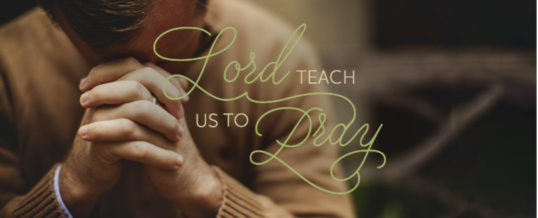
Jesus taught his disciples only one prayer, but more importantly he taught them how to pray. How he wanted them to pray, and how he wants us to pray, is with the confidence of a child before a parent.
When you were really young, and if you had half-decent parents, for all intents and purposes, in your mind your father was God and your mother was the queen of heaven and earth. (Take a look at them now and try not to laugh!). In the mind of a young child, there isn’t anything their parents cannot do. Ask any child and they will tell you their mother is the best mother in the world. She can cook anything better than anyone else’s mother and can solve any and all problems that come her way. And your father can beat up anybody else’s father especially the father of the schoolyard bully. These are some of our first images of God. We obviously lose these naïve concepts of our parents as we grow older. In fact, by age 12, you’re convinced your parents are not only not cool but some of the “stupidest” people around. And, if you could hide them in a closet when your teenage friends came over, you would.
Nevertheless, Jesus starts his prayer off with “Our Father” or more precisely translated in the culture of his day, “Daddy” or “Papa”. Jesus wants us to approach God with the same confidence and intimacy a young child would approach his or her parents with. If you, parents–who are a mixture of good and evil–know how to give good things into the hands of your children, then how much more will your Heavenly Father—who is not a mixture of good and evil, but who is pure goodness—how much more will God put good things in your hands? It’s an argument from the lesser to the greater.
You will always receive fish and eggs from God, never snakes and never scorpions. Only good things and never bad things. What are fish and eggs? They are signs of fertility. That’s why they are given. Because God wants you to live a fruitful life, God is constantly at work putting good things in your hands that will make a fruitful life possible. Fish and eggs are signs of abundance. They are signs of nourishment and sustenance. Everything you need to sustain you in life is the very thing God is just waiting to give you if you simply seek, ask, and knock. But, seek, ask, and knock with confidence, the confidence of a child. To ask with reticence or tentativeness is really an insult to God’s generosity and a lack of trust on our part. Praying is not about prying open the hands of a reluctant God. Praying is about approaching, with open hands, a generous God.
“Give us this day our daily bread. And forgive us our debt, as we have forgiven those who are in debt to us.” These phrases on bread and debts are clearly a prayer given to the poor. It’s the prayer of poor people. Bread and debt are the preoccupation, the entire life, of the peasant class in Jesus’ time and of the poor right down to our time. How do I have food for tomorrow, and how do I pay my bills? Food and debt. By mentioning bread, and more specifically daily bread, Jesus is building on the tradition of manna. During the Exodus, when God lead our ancestors through the desert and eventually to the Promised Land, Moses asked God for food to sustain them. God provided manna, food from heaven, but it was only for the day. If they collected more than one day’s worth, it would rot. There’s the symbolism—what you store up, what you hoard, will rot. Living for today keeps us interdependent. Daily bread might be translated as “just enough” so we need God and we need one anther to get through our days. This way of thinking is surely on a crash course with our culture, which prides itself on independence, self-sufficiency, personal control and now shopping “home alone” by T.V. or computer.
The “Our Father” is the prayer of the poor yet, at the same time, it is the prayer of every human being. We are all “existentially” poor. It means at the center our being—the center of our existence–we are all poor, we are all needy, we are all dependent. Needs do not just arise from time to time; they are daily needs. That is why we need, and that is why we pray for, daily bread.Notice, Jesus didn’t sit his disciples down and say, “Listen up. Here comes catechetical lesson #27…the “Our Father.” He didn’t offer them anything until it was specifically asked for. He waited until they expressed their hunger. The treasure chest was always there. Only with their request, “teach us how to pray,” was the treasure chest opened. It was always theirs, just for the asking. The treasure chest is our as well. The golden key that opens it, is that we simply ask with the confidence of a child.
Fr. Phil Mulligan
JUL
2022

About the Author: